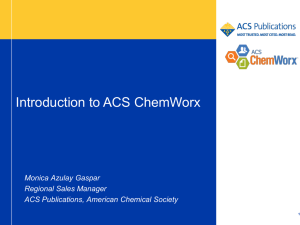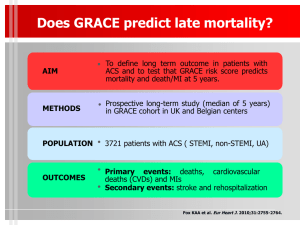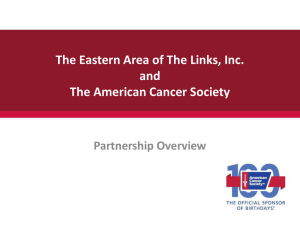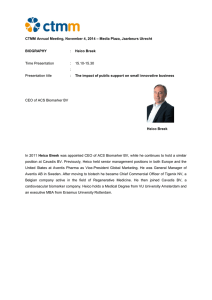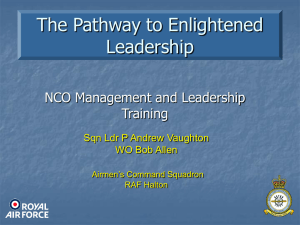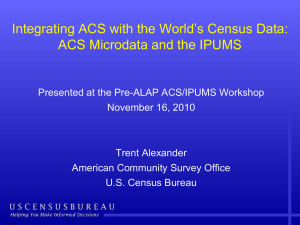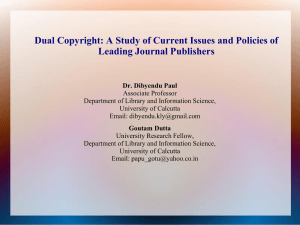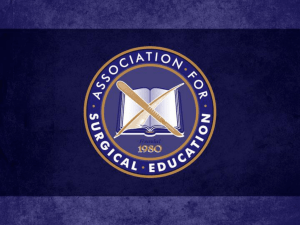Communicating with your Technical Division Members
advertisement
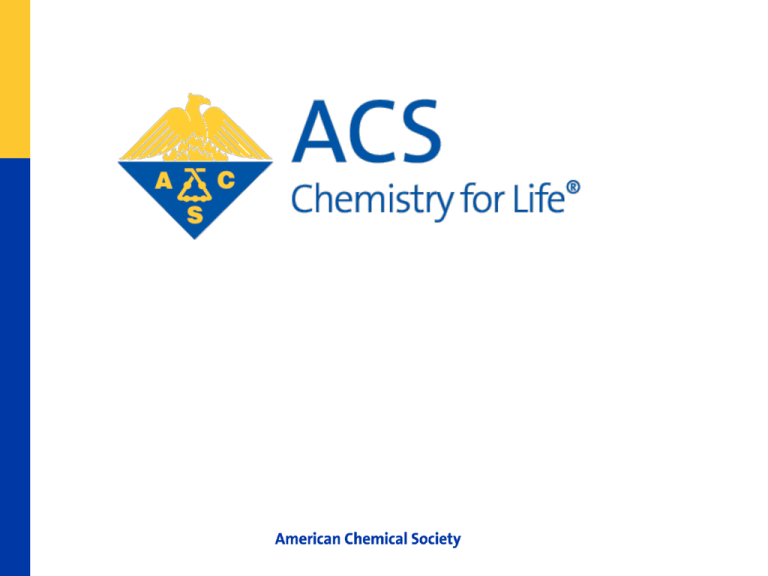
American Chemical Society Communicating with your Technical Division Members ACS Leadership Institute ● Dallas, Texas January 23-25, 2015 ;Jessica Grimes, Technology Associate Administrative & Programmatic Technologies Angela Morris, Technology Associate, Administrative & Programmatic Technologies What You Can Expect from this Session You will come away from this session with information about online communication services offered from ACS that might aid your division’s communications. American Chemical Society 3 Communicating with your Members and the Public Develop a Multi-Channel Strategy • Website: Webs.com − Update your information regularly − Use it in conjunction with any social media efforts (ACS Network, Facebook, Twitter, etc.) • Email: Real Magnet − Using a mass email service is more effective than using a personal email account • Newsletters − Hard-copy and/or electronic based on your members’ preferences • Phone − Consider A+ Conferencing for special rates for Technical Divisions • In-person meetings/events: National or Division Meetings American Chemical Society 4 Communicating with your Members and the Public Website An excellent entry-point to your Technical Division’s full complement of online communications/services • Use your website to: – Tell your origin story (where, when, why and how?) – Post your Annual Report (include a compelling summary) – Post announcements and results of activities – List your Technical Division Officers – Share an events calendar (keep it updated) – Provide first-hand accounts from members – Keep an image gallery from events – Post local job listings perhaps not easily found on your typical job search site. American Chemical Society 5 Communicating with your Members and the Public According to the Technical Division annual reporting for 2013, 32 Technical Divisions reported have websites. American Chemical Society 6 Communicating with your Members and the Public Mass Email When used properly, a mass email service can: • Build trust with your members • Keep your contacts organized • Enable access to email campaign reports (analytics), measure your results after every email campaign • Meet the requirements of the CAN-SPAM act (avoid having your emails get stuck in SPAM filters) American Chemical Society 7 Communicating with your Members and the Public What is the primary mode of communication used to communicate to your members? American Chemical Society 8 Available Online Communication Tools & Services from ACS • Online web-hosting solution provided through our partner, webs.com • Email management service from Real Magnet • The Volunteer Support and Engagement (VSE) Group on the ACS Network (easy access to recent and relevant content for Technical Divisions’ online and hard-copy communications) American Chemical Society 9 Online Web-Hosting solution • In 2009 – to meet the needs of our Local Sections and Technical Divisions, ACS partnered with webs.com to provide a free, online web-hosting solution. • To date, 10 Technical Divisions have signed up for the service • Is your division using the service? Ask us if you’re not sure. American Chemical Society 10 Online web-hosting solution Main benefits of the service include: • ACS branded, easy to use templates American Chemical Society 11 Online web-hosting solution Main benefits: • A user-friendly web editor (no need to know HTML) American Chemical Society 12 Online web-hosting solution Main benefits: • Ability to easily hand over web administration duties from one person to another American Chemical Society 13 American Chemical Society 14 Email Service Providers American Chemical Society 15 Email Management Service • To meet the critical needs of our members, ACS has partnered with Real Magnet to offer a free, mass email service for local sections and technical divisions. American Chemical Society 16 Email Management Service Main benefits of the service include: • Individual account with intuitive dashboard American Chemical Society 17 Email Management Service Main benefits: • ACS branded template to put your message within American Chemical Society 18 Email Management Service Main benefits: • Message tracking - insight into a message’s performance, with all the key metrics (delivery, open rate, clicks, bounces and unsubscribes) represented both numerically and graphically. American Chemical Society 19 Email Management Service • Use your current email address or any pre-existing email address • Download lists, i.e. from eRosters and upload into Magnet Mail – you’ll need to update the list each time you send a new email. • You will upload your lists to 1 of 2 Groups in Magnet Mail: – Promotional emails, i.e. invitations to events, general communications and info (must have the opt-out option for promotional emails) – Administrative emails, i.e. elections and governance meetings, etc. • Designate up to 2 email administrators • Interested in singing up for the service? Contact EMS@acs.org American Chemical Society 20 American Chemical Society 21 ACS Network for Technical Division Activities American Chemical Society 22 Goal for the ACS Network Social Tool Extends existing activities of the ACS and the chemical community by leveraging the benefits of efficiency and inclusiveness American Chemical Society 23 Why Choose the ACS Network • It is a networking and document sharing tool of the American Chemical Society • Functionality is developed with the chemical community in mind • Single Sign On (SSO) access: the ACS ID, you use to renew your dues, access C&EN, or other publications online • Career connections with other chemists throughout your career American Chemical Society 24 Content on ACS Network • Types of features: – Discussions, Documents – Uploaded files – Blogs – Videos – Bookmarks – Ideas • “Liking” or Rating • Follow, Track – Email notifications • Controlled collaboration American Chemical Society 25 What Members Are Doing • Creating Profiles: Feature your CV • Building Social Professional Networks: Connect, reconnect and establish professional contacts • Engaging in Discussions: Host dynamic forums open to anyone with an ACS ID • Sharing Content: Upload files of almost any format or create pages • And More…………. American Chemical Society 26 Tips on Setting Up a “Group” • Identify Purpose of Group – Technical Division Group, Executive Committee, Science Café Group… • Identify people with a common task or interest to populate the group – Open, Members Only, Private or Secret • Determine functionality and tasks for a group – Keep minutes, notes, and any other documents generated for and by division offices – Start discussions and begin to facilitate committee work outside of face-to-face meetings • Inform and advocate – Encourage dialogue American Chemical Society 27 Governance Activities Manage Your Technical Division Business • Licensed and customized platform by ACS for the chemical community – Secure, trusted environment • Centralized location for ACS business – free to technical divisions • Eliminates security, copyright, and access issues that come with thirdparty platforms American Chemical Society 28 Technical Division Governance Activities General Activities • A group (open, members, or private group) can be set up for the entire technical division to host member discussions Technical Division Events • Use the Network to help your chapter decide as a group what events you want to sponsor • Invite members and promote them using the events function • Post pictures in a photo album or share a video for all your members to see after the event Grants and Awards Selection Process • Set up a private group for reviewing applications • Use ideation, 5-star rating, or polls American Chemical Society 29 Actively Engaged Technical Divisions American Chemical Society 30 Actively Engaged Divisions American Chemical Society 31 ACS Network: Volunteer Support & Engagement • http://communities.acs.org/groups/vse • An open group where pertinent information for dedicated ACS members can be found, posted and shared. American Chemical Society 32 American Chemical Society 33 How to Contact • Online web-hosting solution: webhosting@acs.org • Email Management Service (EMS): ems@acs.org • ACS Network: acsnetworkfeedback@acs.org • Jessica Grimes, Technology Associate, Administrative & Programmatic Technologies: j_grimes@acs.org • Angela Morris, Technology Associate, Administrative & Programmatic Technologies: a_morris@acs.org American Chemical Society 34 Thank You
